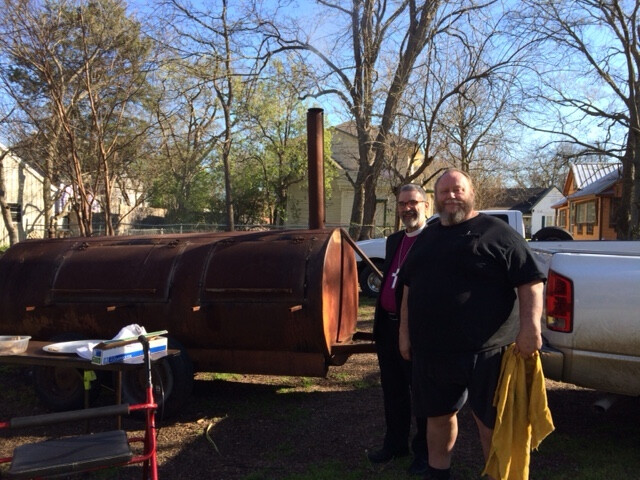Olfactory Theology

Easter is feast, not fast, tide, and this is Texas, so what better than an Easter meditation on smoker and brisket. I recently blessed a big one at Holy Trinity, Bonham. Its owner Rick told me that a similar cooker, also the size of a trailer was once stolen from his backyard - if you see that outlaw cooker headed down the highway, call the diocese!
The smell of cooking meat wafted over the church grounds throughout our Palm Sunday service. It reminded me of the following verse from II Corinthians 2:15-16:
“For we are the aroma of Christ to God among those who are being saved and among those who are perishing, to the one a fragrance from death to death, to another from life to life. Who is sufficient for these things?”
All of this made me think of one of the most memorable moments in the walkabout. We were at St. James Kemp and heard about a feeding program aimed at kids in a neighborhood with lots of challenges including drugs. Men in the parish set up smokers at the margins and let the smell of meat waft over the neighborhood and kids came all weekend to eat - no more advertising or explanation necessary. (The story bespoke the creativity and winsomeness of that parish in general!)
Let’s reflect for a moment on the brisket model of evangelism. Paul tells us that the witness we offer to the love of God in Christ should waft. There is something gentle and gradual about that image, one that allows the Spirit to work as it will. I am not convincing others, though giving reasons has its place. I am letting the beauty of the news of the resurrection of Jesus go where it will in my neighborhood and to do its work. And it surely will, for humans are wired for it, in spite of our flaws, as surely as the sense of smell is wired at the deepest levels of our brains. People will make what they will of it too - Paul says the same odor connotes life for one, death for another. It is not for us to suppose we can determine which - we have to make sure the waft keeps coming. Paul finishes that passage with a statement about how insufficient we are for such great things. We cannot compel anything, nor are we to shirk anything. In the preceding verse he has said that we are the triumphal procession of those taken captive by the love of God in the crucified and risen Christ. It assumes incense along the way - it is a great liturgically - friendly image. We have no choice. We walk the path in His wake. It is a triumphal procession, whatever others make of it. And through those ancient streets there were odors of various kinds. Which odor predominates depends - but walk in public, amidst those reactions, we must.
All of this leaves us with an exhortation and a question. The first is the importance of confidence that the aroma will smell of life and draw the neighbors. The question is this: how best to allow the aroma to waft over our neighborhood, the Church being the Easter cooker.
Peace,
+GRS



